Overview
The article highlights ten inspiring mission examples for tech startups, showcasing how established companies like Patagonia, Apple, and Tesla successfully weave values such as sustainability, user experience, and social responsibility into their business models.
It's a common challenge for new founders to feel overwhelmed in a competitive market, where standing out can seem daunting. However, these examples serve as a beacon of hope, illustrating that aligning a startup's mission with meaningful principles can significantly enhance customer loyalty.
This is especially important in today's world, where consumers increasingly favor brands that prioritize such values. By embracing these principles, tech startups can not only differentiate themselves but also foster a deeper connection with their audience, nurturing a community that shares their vision.
Introduction
In a world where technology evolves at breakneck speed, many startup founders find themselves grappling with the challenge of defining their mission. This struggle can often feel overwhelming, as they seek to illuminate paths toward innovation, sustainability, and community engagement. However, mission statements of successful startups can serve as guiding lights, offering not just direction but also a sense of purpose.
This article explores ten inspiring business mission examples from tech companies that not only define their identities but also resonate deeply with consumers. As startups strive to carve out their niches, the question remains: how can they craft missions that reflect their values while fostering genuine connections with their audiences? By examining these exemplary missions, we uncover strategies for success and the profound impact they can have on brand loyalty and market positioning, nurturing a sense of community in the ever-evolving tech landscape.
RNO1: Empowering Brands Through Innovative Digital Experiences
In today's fast-paced digital world, many tech startup founders grapple with the challenge of establishing a strong online presence. This struggle can often lead to feelings of uncertainty and frustration, as they seek to connect with their target audiences in meaningful ways. At RNO1, we understand these challenges deeply. We stand as a prominent global marketing and digital growth agency, dedicated to creating innovative digital experiences that empower businesses like yours.
Our focus on branding, user experience (UX), and digital product design equips companies to thrive in an increasingly competitive environment. We offer innovative subscription models—Revolve, Retrn, and Ryde—that provide continuous access to expert support and resources. This fosters long-term partnerships that inspire innovation and adaptability. For tech startups, this model can be particularly advantageous, allowing you to solidify your digital presence and engage effectively with your audience.
As the digital marketing landscape evolves in 2025, we align our approach with the latest trends, highlighting the importance of personalized experiences and strategic positioning. Our specialists emphasize that it’s crucial for companies to not only focus on visual identity but also to build trust and emotional connections with customers. At RNO1, we are here to support you through our extensive services, nurturing your growth and helping you navigate the complexities of the digital world. Together, we can create experiences that resonate and foster lasting relationships with your audience.
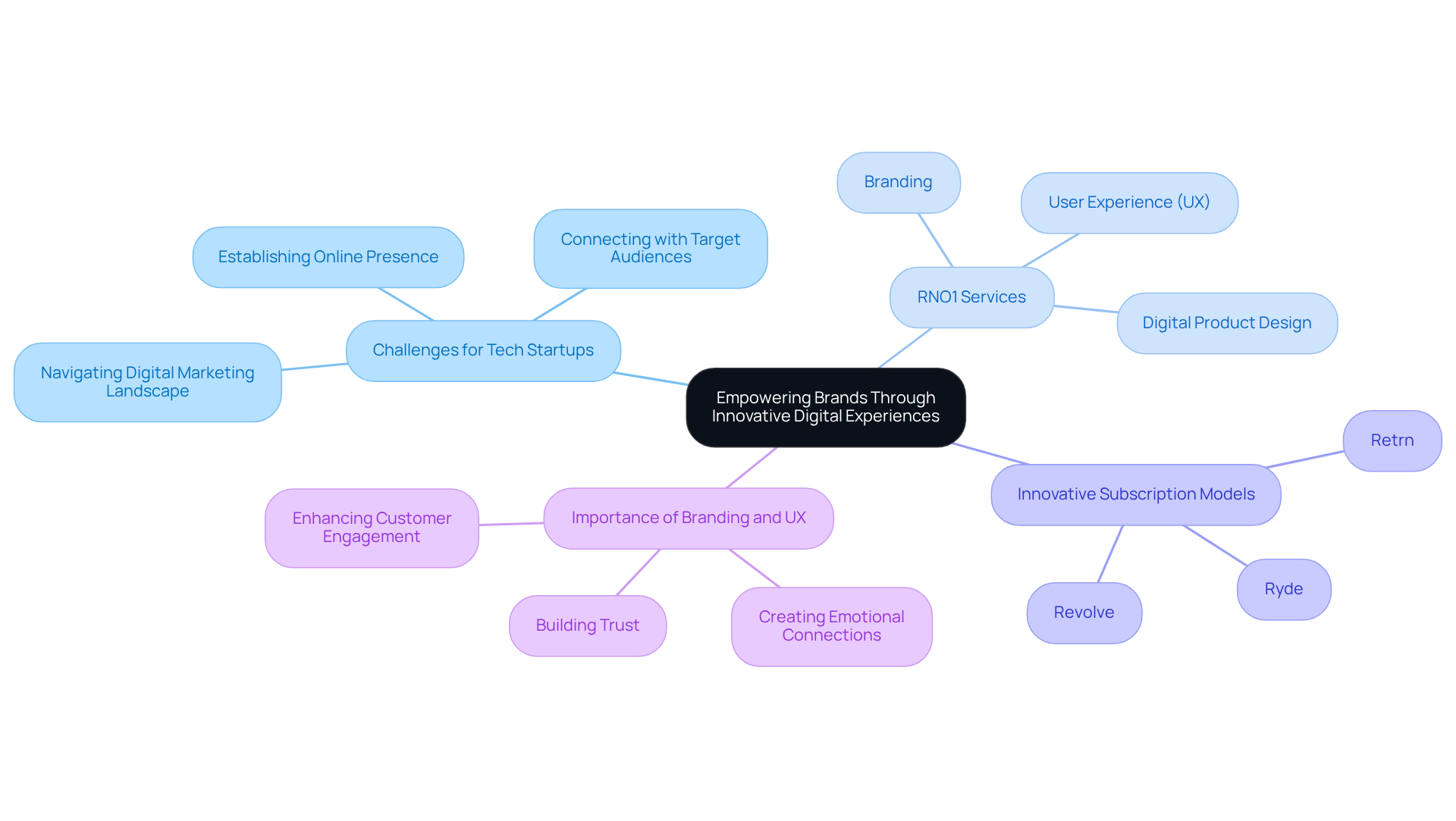
Patagonia: Committing to Environmental Responsibility and Activism
Patagonia’s mission highlights a pressing issue: the need for environmental responsibility and activism. As we face the consequences of climate change, many individuals feel a growing concern about their ecological impact. This concern is not just a personal struggle; it reflects a broader societal challenge that resonates deeply with consumers today. Patagonia’s commitment to reducing its carbon footprint and promoting sustainable practices is a beacon of hope.
The company has pledged to eliminate virgin petroleum materials from its products and actively supports grassroots environmental initiatives. This dedication not only enhances Patagonia's identity but also serves as a nurturing model for tech companies eager to embrace sustainable practices. By aligning their values with eco-conscious individuals, startups can cultivate loyalty and distinguish themselves in a competitive market.
In fact, 67% of shoppers view sustainability as significant when selecting companies, and 38% of individuals express that minimizing their ecological footprint is a primary concern when choosing fashion items. This emphasizes the profound impact that environmental responsibility can have on customer loyalty. Moreover, 73% of millennials are willing to pay more to support sustainable brands, reflecting a strong preference for eco-friendly practices.
As Patagonia demonstrates, integrating sustainability into business practices is not merely a trend; it is a necessary evolution that resonates with today’s consumers. Together, we can foster a community that prioritizes the planet and supports businesses committed to making a difference.
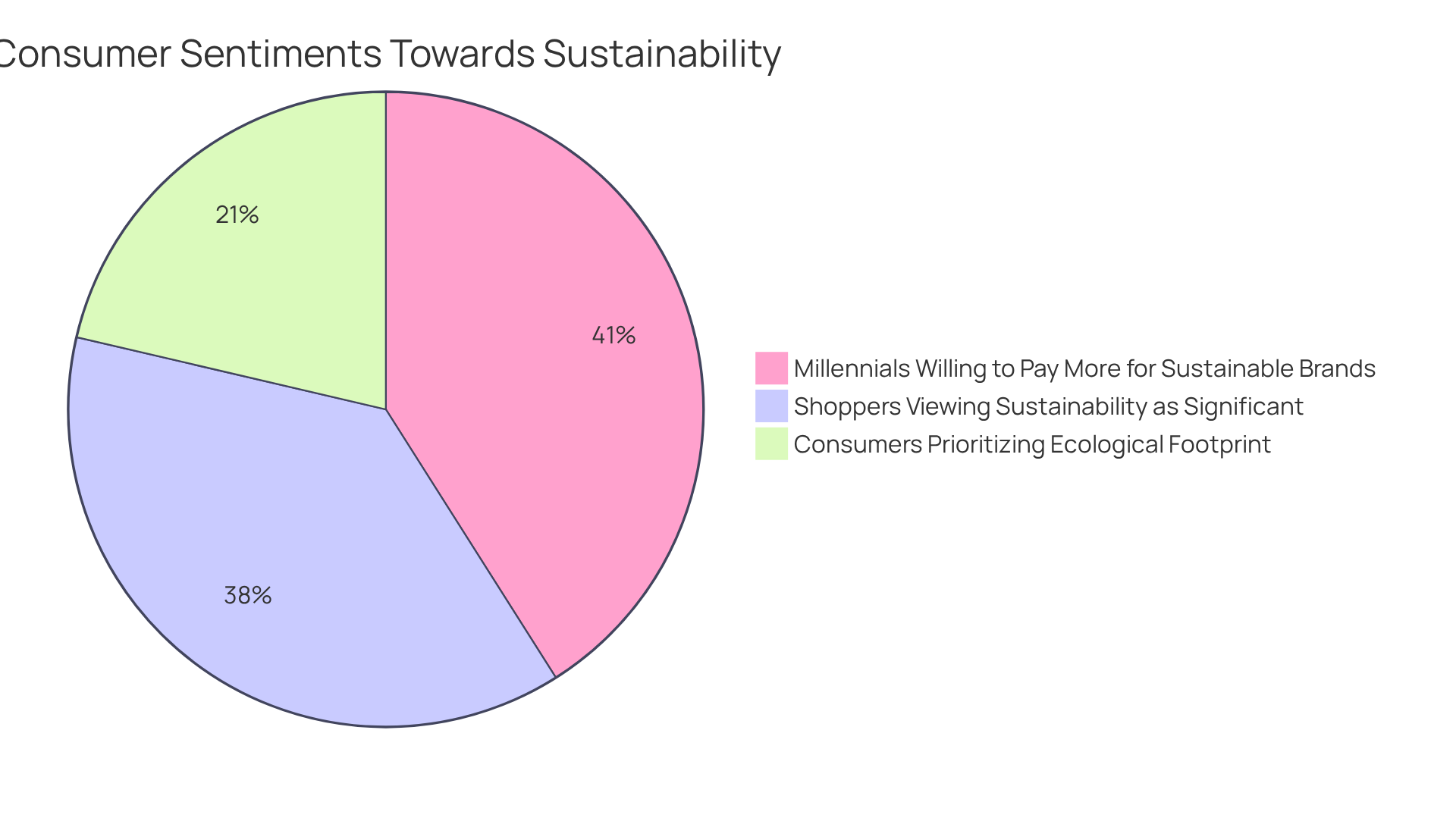
Apple: Leading with Innovation and User-Centric Design
In today's fast-paced tech landscape, many startups grapple with the challenge of delivering an exceptional user experience. This struggle can often lead to frustration, as they strive to meet the demands of their clients while navigating a competitive market. Apple's mission, which focuses on providing the best user experience through innovative hardware, software, and services, serves as one of the most notable business mission examples for these startups. Their unwavering commitment to user-centric design has not only solidified their leadership in the tech industry but also offers valuable insights for others to follow.
Consider this: 80% of customers view a company's experience as just as crucial as its products or services. This statistic underscores the urgent need for startups to prioritize user experience in their product development. By adopting business mission examples similar to those of Apple, technology companies can create products that truly resonate with users, fostering engagement and loyalty. As the market for user-focused design continues to expand—projected to reach $7.43 billion in the UI design sector by 2032—those who embrace these principles will find themselves well-positioned for success in a crowded field.
RNO1 exemplifies this approach through transformative partnerships, such as their collaboration with Figure, where they enhance modern HR platforms with human-centric digital experiences. These partnerships reflect RNO1's dedication to improving user experiences across various sectors. Furthermore, startups that prioritize mobile optimization—74% of users are more likely to return to a mobile-friendly site—can thrive in this competitive landscape.
As one expert insightfully remarked, "Design is what creates the first impression." This highlights the importance of investing in UX design, not just for immediate gains but for long-term success. By embracing the principles of user-centric design and fostering a supportive community, startups can navigate their challenges with confidence and compassion.
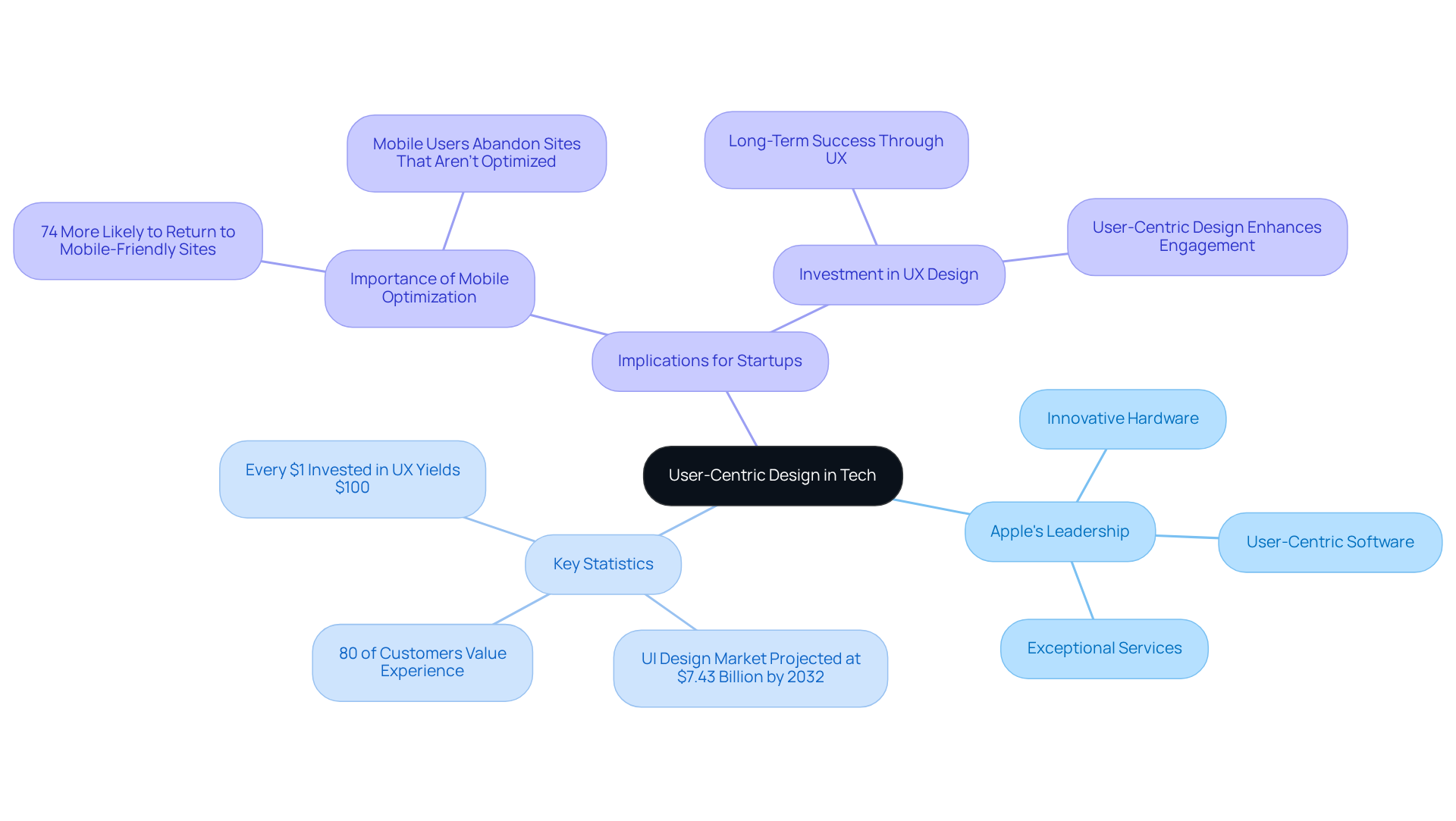
Nike: Inspiring Athletes to Achieve Their Best Through Innovation
Nike's mission, as seen in various business mission examples, is to inspire and innovate for every athlete in the world. This guiding statement not only shapes product development but also nurtures a culture of excellence and motivation.
Yet, many startup founders grapple with the challenge of standing out in a competitive landscape. The pressure to innovate can feel overwhelming, leaving them uncertain about how to connect with their audience.
RNO1's strategic rebranding of Founder's Haven highlights a compassionate approach to this dilemma, showing how empowering modern founders can lead to digital success through performance marketing expertise. By harnessing data-driven strategies, RNO1 supports tech companies in scaling their eCommerce efforts, much like Nike emphasizes the power of storytelling and innovation.
Incorporating captivating narratives into their messaging allows new businesses to engage their teams and clients, creating a sense of purpose and connection. Embracing innovation as a core value can inspire teams to push boundaries and explore new possibilities, just as Nike has redefined athletic performance.
The impact of storytelling on loyalty is profound; startups that effectively communicate their business mission examples and values foster a devoted clientele that feels a genuine connection to their vision.
Together, we can navigate these challenges, ensuring that every founder feels supported and empowered on their journey.
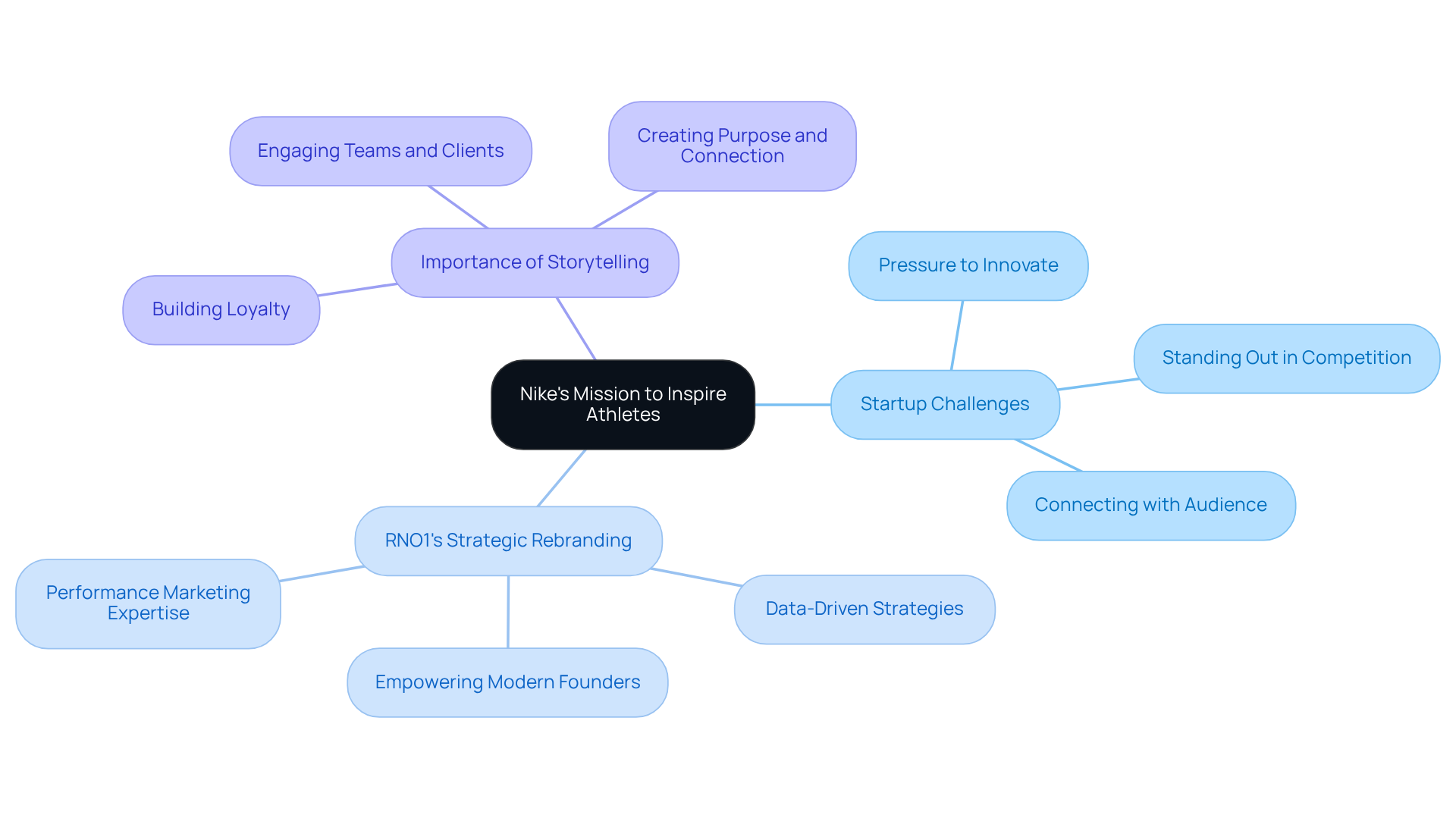
TOMS: Creating a Better Tomorrow Through One-for-One Giving
TOMS has truly transformed the retail landscape with its compassionate One-for-One giving model, where every product sold translates into a pair of shoes given to someone in need. This heartfelt mission has led to the donation of over 35 million pairs of shoes to children across 70 nations, addressing urgent social challenges and nurturing a loyal customer base that values corporate accountability.
By intertwining their business mission examples with social impact, TOMS has demonstrated that brands can not only enhance their identity but also build loyalty among those who care deeply about social issues. Initiatives like the 'One Day Without Shoes' campaign foster a sense of community and shared purpose, further deepening customer loyalty.
The partnerships TOMS has forged with NGOs for distribution are vital to their operational model, underscoring their commitment to social responsibility. As Blake Mycoskie, the founder of TOMS, beautifully puts it, "The value proposition is straight, simple, yet powerful: improve the lives of millions of people around the world while creating a for-profit sustainable business model."
Tech companies can take inspiration from this model, embracing similar initiatives to resonate with their audience and stand out in a competitive market. Research indicates that 91% of consumers globally are inclined to switch to companies that support positive causes, revealing a significant opportunity for new businesses to build trust and loyalty by highlighting effective business mission examples through meaningful corporate responsibility efforts.
Yet, TOMS also encounters challenges such as competition and the necessity for ongoing innovation, emphasizing the importance of evolving corporate responsibility strategies.
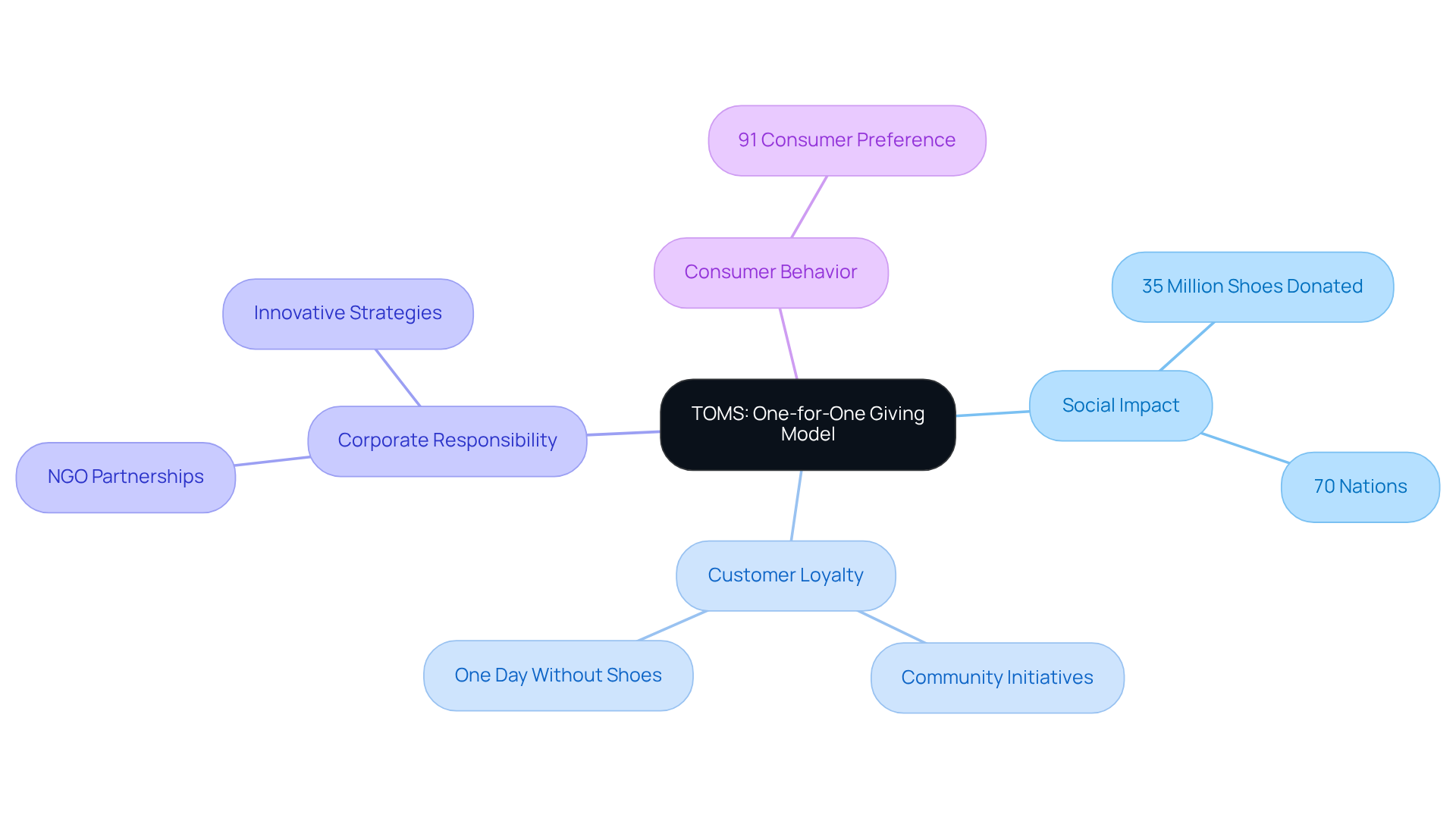
Khan Academy: Providing Free Education for Anyone, Anywhere
Khan Academy's mission addresses a significant problem: the lack of accessible education for all. This challenge affects countless individuals who yearn for knowledge but face barriers to entry. The implications are profound; without access to quality education, potential remains untapped, dreams go unfulfilled, and opportunities are lost.
However, Khan Academy stands as a beacon of hope, dedicated to providing a free, world-class education for anyone, anywhere. This commitment not only transforms the educational landscape but also serves as an inspiring blueprint for technology companies, providing valuable business mission examples aimed at democratizing access to their offerings.
By prioritizing inclusivity, businesses can enhance their reputation and reach a broader audience, fostering a community where everyone has the chance to thrive. Together, we can create a future where education knows no boundaries.
Tesla: Accelerating the World's Transition to Sustainable Energy
Tesla's mission is to accelerate the world's transition to sustainable energy, a noble goal that resonates with many of us. The challenge many companies face today is how to incorporate sustainability into their core values. This focus not only drives innovation in electric vehicles but also positions Tesla as a leader in the renewable energy sector. For technology companies, taking cues from Tesla's commitment can attract environmentally conscious individuals. It's concerning to note that 84% of customers would abandon companies with poor environmental practices, underscoring the critical role sustainability plays in fostering customer loyalty.
Moreover, Tesla's commitment to a 100% closed-loop battery recycling system by 2026 exemplifies its innovative approach to sustainability. This dedication serves as an inspiring example for new ventures looking to differentiate themselves in a competitive landscape. By prioritizing sustainable practices, they can enhance their brand perception and drive growth. Furthermore, it's worth noting that 75% of sustainable products perform better online than in physical locations. This trend presents a valuable opportunity for tech companies to effectively engage eco-aware individuals.
As the market increasingly favors sustainable solutions, new enterprises that align their missions with environmental responsibility are likely to thrive in the evolving digital economy. Together, we can embrace these changes and support one another in building a future where sustainability is at the forefront of our business practices.
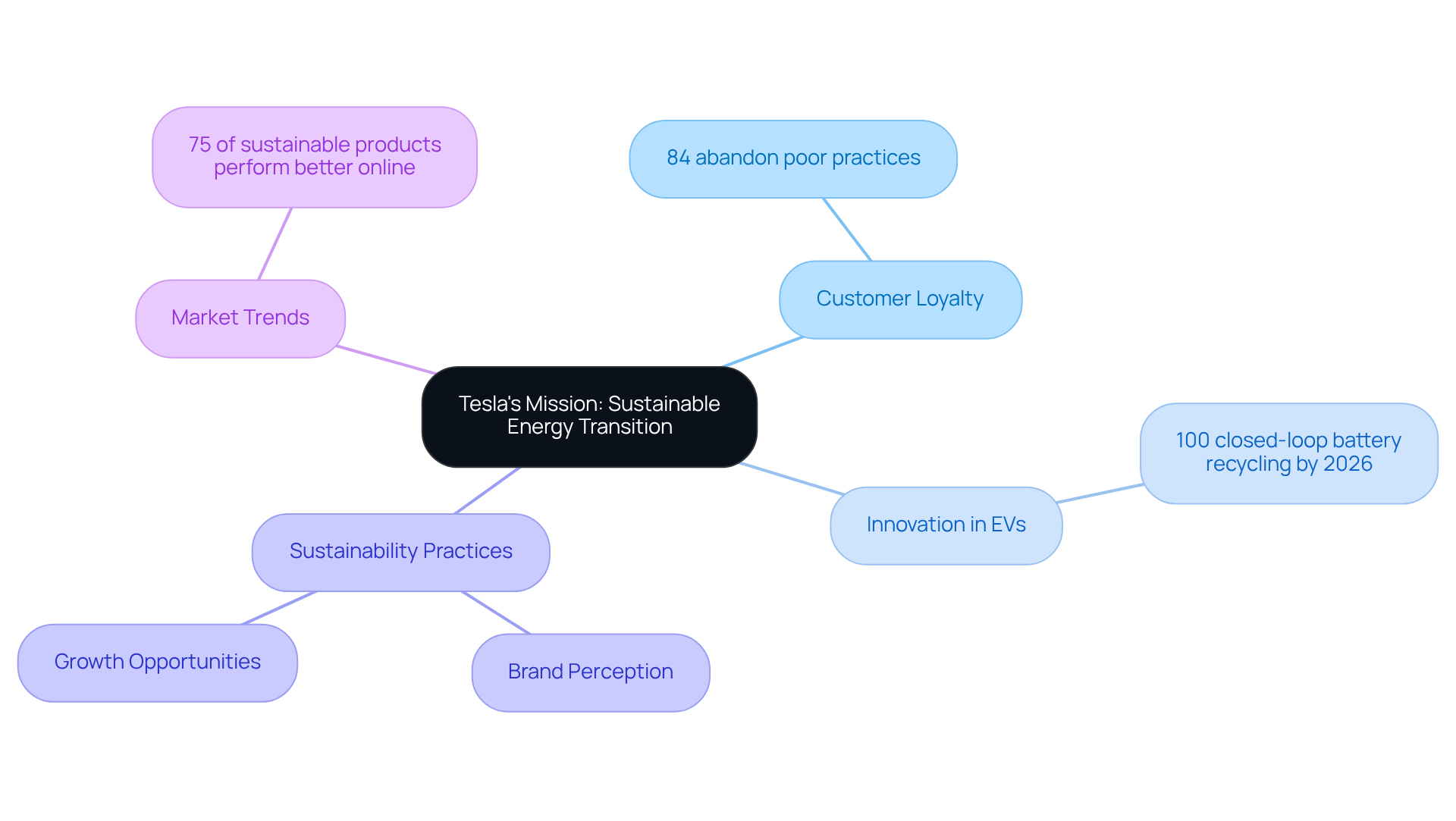
Ben & Jerry's: Advocating for Social Justice and Community Engagement
Ben & Jerry's mission highlights the importance of advocating for social justice and fostering community engagement, seamlessly weaving these values into their business practices. This commitment not only builds a strong identity but also fosters a deep connection with customers, enhancing their loyalty and trust.
For tech companies, there are valuable lessons to be learned from Ben & Jerry's approach. By using their platforms to tackle pressing social issues, they can cultivate meaningful connections within their communities. Aligning business strategies with social causes can significantly influence customer loyalty; in fact, 71% of Gen Z consumers feel positively about companies associated with social causes.
Moreover, 88% of Americans show greater forgiveness towards companies that genuinely strive to improve, highlighting the transformative potential of community engagement in customer relationships. Notably, 64% of Americans choose, change, evade, or refuse companies based on their stance on social issues, underscoring the critical role of community involvement in nurturing loyalty.
By emulating Ben & Jerry's model, tech companies can craft authentic narratives that reflect their values, ultimately driving both social impact and business success. As Ben Cohen wisely noted, 'If you support the community, they will support you.'
However, new ventures must remain mindful of the skepticism that individuals may harbor towards companies perceived as exploiting social causes for profit. By effectively implementing cause marketing strategies, new businesses can raise awareness and funds for vital causes while simultaneously building goodwill and positive brand associations.
Furthermore, 91% of consumers are more inclined to purchase from a company that supports social or environmental issues, reinforcing the significance of aligning business strategies with social causes.
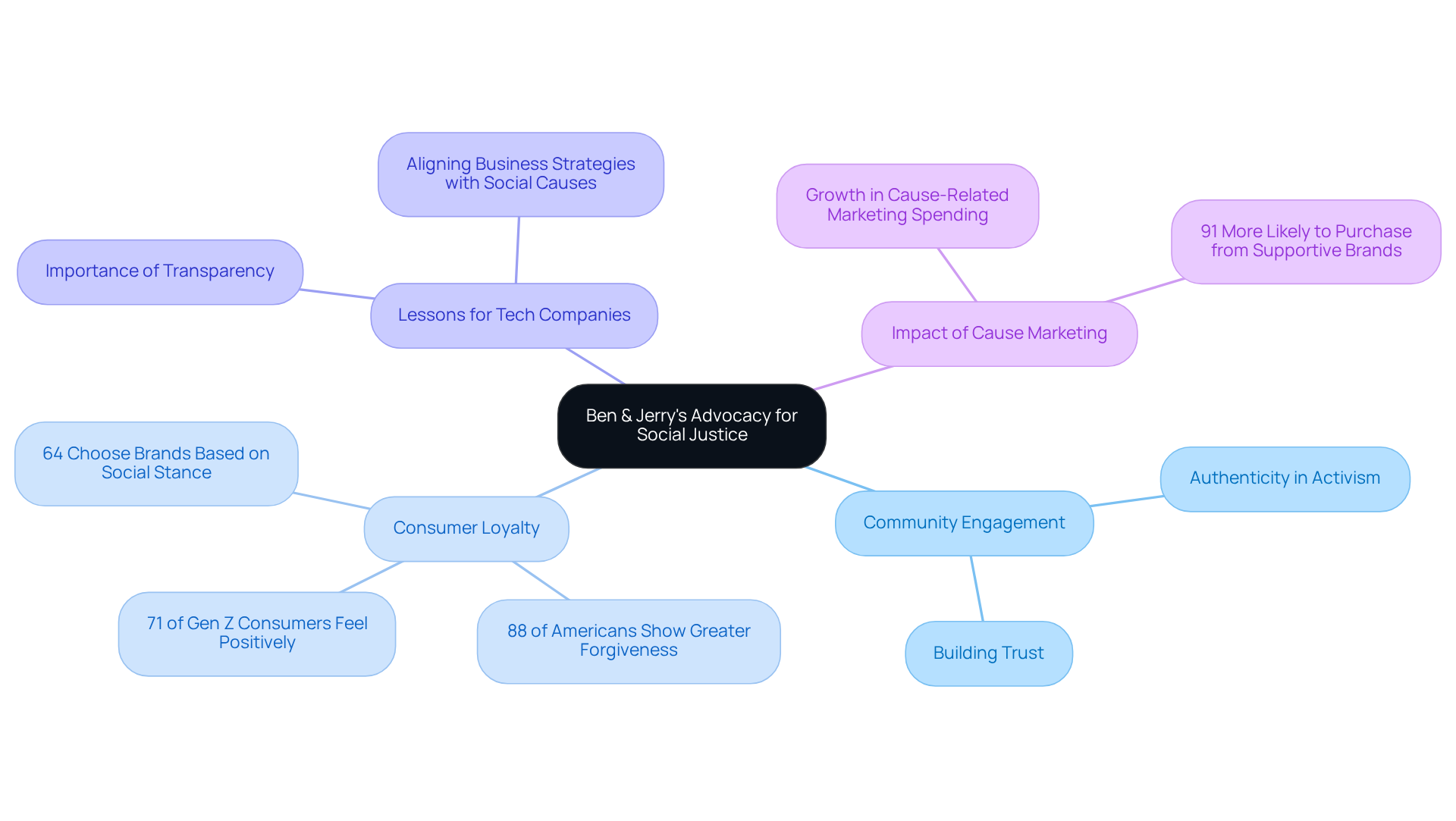
Adobe: Empowering Creativity for All Through Technology
Adobe's mission is a beacon of hope, centered on empowering creativity for all through technology. This commitment has not only solidified its position as a leader in the creative software industry but also highlights a challenge many tech startups face: how to foster creativity in a rapidly evolving landscape. By focusing on innovation and user empowerment, Adobe enhances user experiences and nurtures a culture of creativity that other technology companies can aspire to emulate. For startups, this presents a valuable lesson: designing products that inspire and enable users can significantly drive engagement and satisfaction.
As the creative technology landscape evolves, it’s crucial for new ventures to adopt trends that prioritize user experience. Quotes from industry leaders remind us that creativity flourishes when technology acts as a facilitator, allowing individuals to explore and express their ideas freely. By embracing a similar mission, technology companies can create environments where creativity thrives, leading to innovative solutions that resonate deeply with users. In this journey, let’s remember that together, we can cultivate a community where creativity and technology coexist harmoniously, empowering every individual to contribute their unique voice.
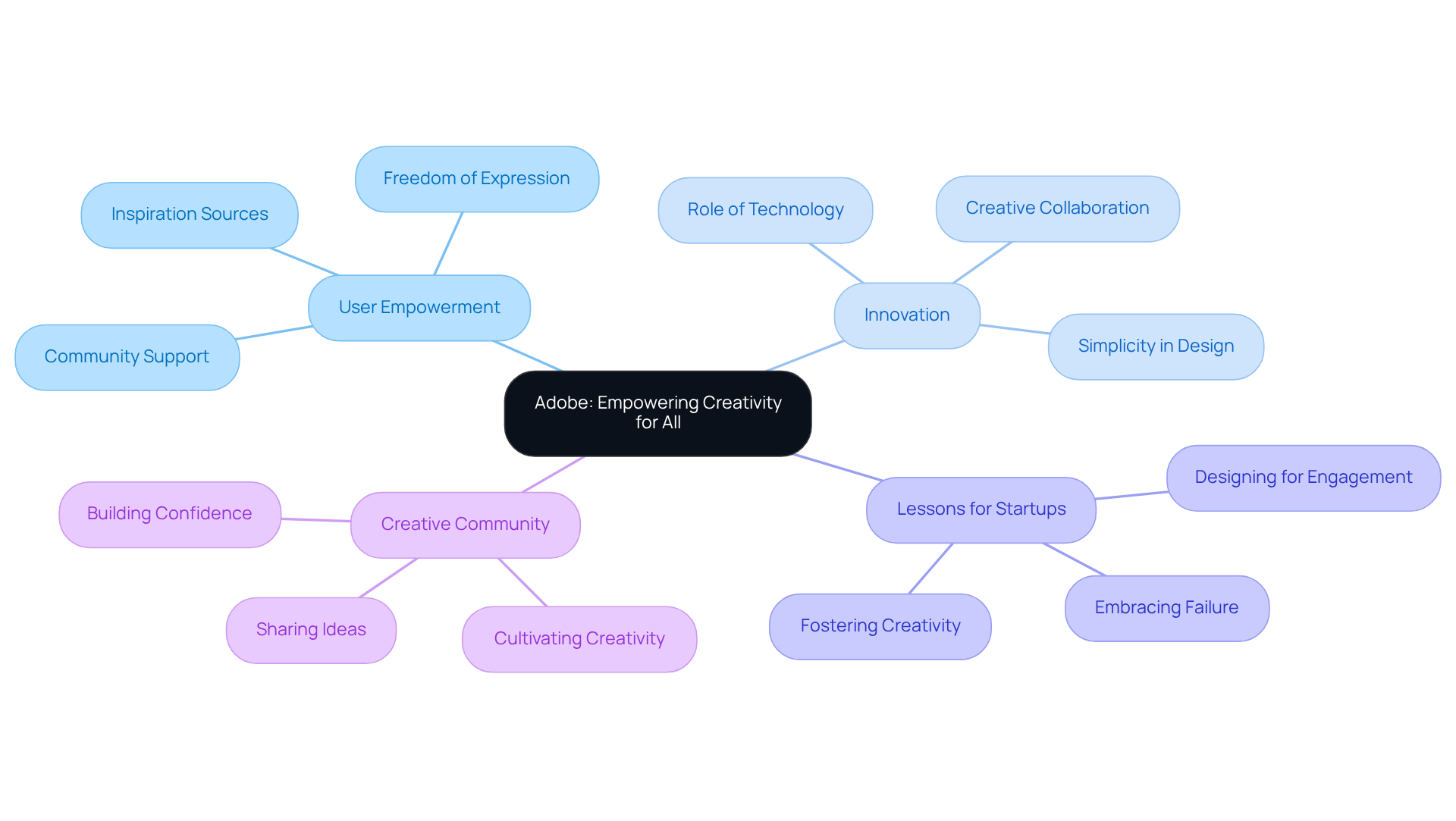
Zappos: Delivering Happiness Through Exceptional Customer Service
Zappos' mission, which is one of the notable business mission examples, centers on creating happiness through exceptional service, a commitment that has solidified its position as a leader in the eCommerce landscape. This unwavering focus on client satisfaction not only nurtures brand loyalty but also sets a benchmark for technology startups eager to thrive in a competitive marketplace.
When startups prioritize user experiences, they can forge meaningful connections with their clients, reflecting the success Zappos has achieved. Industry experts reveal that 86% of clients are willing to pay more for quality service, underscoring the real benefits of investing in client satisfaction.
Furthermore, Zappos exemplifies how a commitment to service can transform client interactions into memorable experiences, ultimately encouraging repeat business and enhancing overall reputation. Alarmingly, 96% of consumers will leave a company due to poor customer service, which highlights the crucial role that customer service plays in retaining clients.
Howard Schultz beautifully notes that when individuals feel a bond with a brand’s values, they are more inclined to remain loyal, reinforcing the significance of outstanding service in cultivating brand loyalty. By embracing these principles, tech startups can create a supportive environment that fosters lasting relationships with their customers, which serves as valuable business mission examples.
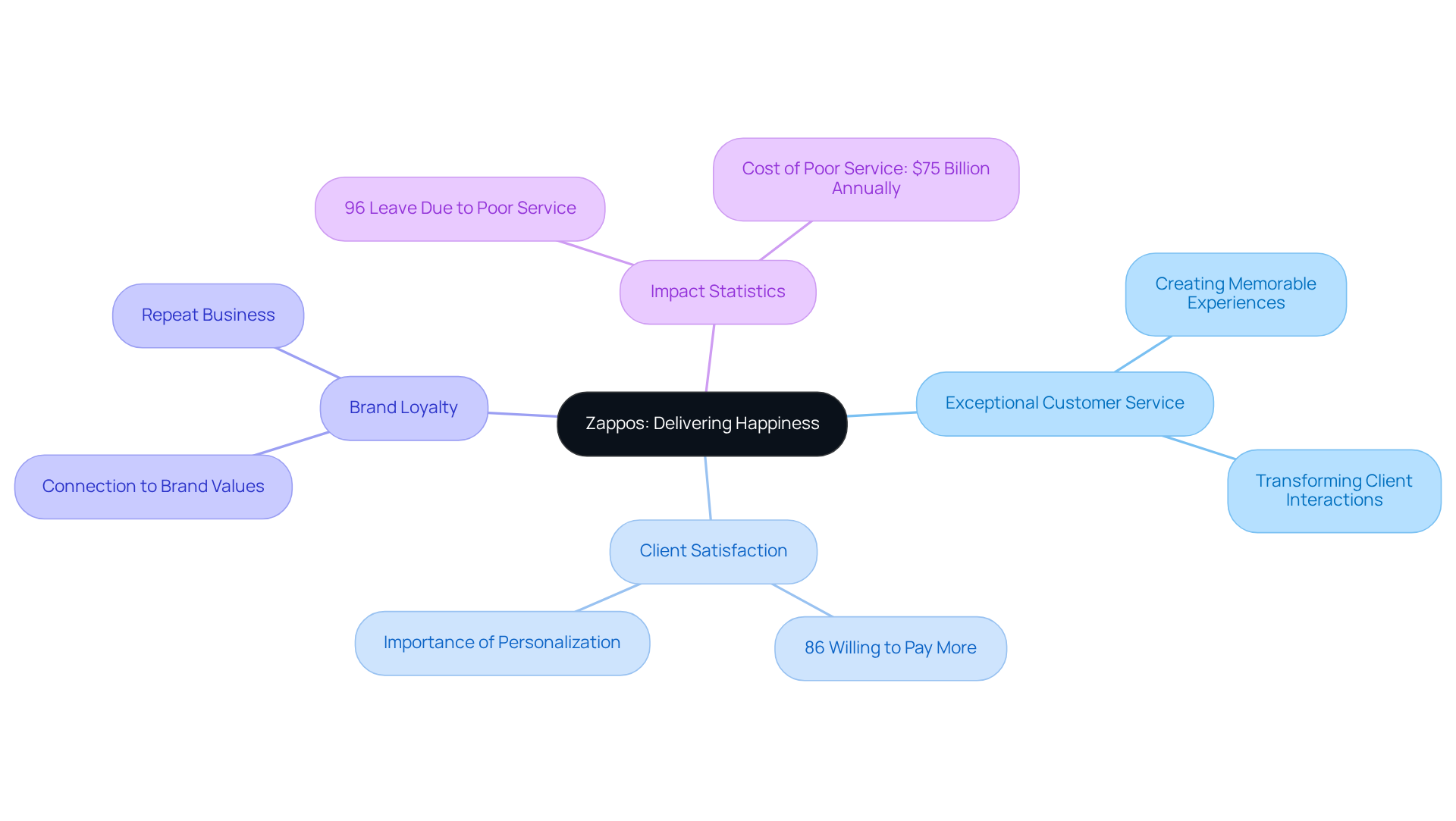
Conclusion
Tech startups often grapple with the challenge of establishing a meaningful connection with their audiences in a competitive landscape. This can lead to feelings of uncertainty and overwhelm as they seek to carve out their unique identities. However, there is hope. By drawing inspiration from the missions of established companies that have successfully navigated their markets, startups can find a guiding light.
Consider the powerful mission statements of companies like:
- RNO1
- Patagonia
- Apple
- Nike
- TOMS
- Khan Academy
- Tesla
- Ben & Jerry's
- Adobe
- Zappos
Each of these examples illustrates how a well-defined mission can not only drive customer loyalty but also foster community engagement. For instance, Patagonia’s commitment to environmental activism and Zappos’ dedication to exceptional customer service showcase the diverse ways in which mission statements can shape a brand's identity and resonate with audiences.
The significance of a strong business mission cannot be overstated. It serves as a beacon for startups aiming to forge meaningful relationships with their customers. By embracing the lessons from these inspiring examples, tech startups can enhance their brand identity and contribute positively to society and the environment. This nurturing approach not only attracts a loyal customer base but also paves the way for sustainable growth and success in the ever-evolving tech industry. Remember, you are not alone on this journey; by learning from others, you can create a lasting impact.
Frequently Asked Questions
What challenges do tech startup founders face in establishing an online presence?
Tech startup founders often struggle with uncertainty and frustration as they seek to connect with their target audiences in meaningful ways in a fast-paced digital world.
How does RNO1 assist businesses in overcoming digital challenges?
RNO1 is a global marketing and digital growth agency that creates innovative digital experiences, focusing on branding, user experience (UX), and digital product design to help businesses thrive in a competitive environment.
What subscription models does RNO1 offer to support tech startups?
RNO1 offers innovative subscription models called Revolve, Retrn, and Ryde, which provide continuous access to expert support and resources, fostering long-term partnerships for innovation and adaptability.
Why is personalization important in digital marketing according to RNO1?
As the digital marketing landscape evolves, RNO1 emphasizes the importance of personalized experiences and strategic positioning to build trust and emotional connections with customers, beyond just focusing on visual identity.
What environmental commitment does Patagonia promote?
Patagonia is committed to environmental responsibility by eliminating virgin petroleum materials from its products and supporting grassroots environmental initiatives, reflecting a broader societal challenge regarding ecological impact.
How does consumer behavior relate to sustainability according to Patagonia's findings?
67% of shoppers consider sustainability significant when selecting companies, and 73% of millennials are willing to pay more to support sustainable brands, highlighting the importance of environmental responsibility in customer loyalty.
What lessons can tech startups learn from Apple's approach to user experience?
Apple’s focus on providing the best user experience through innovative design serves as a model for startups, emphasizing that 80% of customers view a company's experience as critical as its products or services.
What is the projected market growth for user-focused design, and why is it important?
The market for user-focused design is projected to reach $7.43 billion in the UI design sector by 2032, indicating that startups prioritizing user experience will be well-positioned for success in a competitive landscape.
How does RNO1 exemplify user-centric design in its partnerships?
RNO1 enhances modern HR platforms with human-centric digital experiences through transformative partnerships, showcasing its dedication to improving user experiences across various sectors.
What role does mobile optimization play in user engagement?
Mobile optimization is crucial as 74% of users are more likely to return to a mobile-friendly site, highlighting the importance of investing in UX design for long-term success.




